By JUDITH VANDEWATER
Photos by STEVE RUARK
BALTIMORE — Shahid Nassir was raised in grinding poverty in West Baltimore. He recalls hunting for something to eat in his family's refrigerator and finding only a milk jug full of water and a bag of rotting onions. His schoolmates kept a distance from him, and it stung. "Kids know when you are not eating that much, when your clothes are dirty, when you smell different," he says.
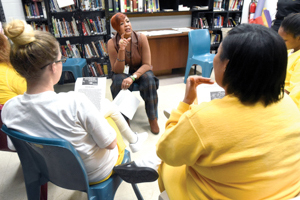
Alfreda Robinson-Dawkins, center, advises women incarcerated at Baltimore's Chesapeake Detention Facility to focus on what they need to do to keep their families functioning without them, should they be sentenced to prison. Robinson-Dawkins started the women's prison reentry program at Bon Secours Community Works.
He befriended boys like himself — hungry, fatherless, fierce. And together they stole from other children.
"This was grade school. I was a real bad kid. I was real angry; I thought society owed me. I just wanted to make someone else feel my pain," he says now, speaking from the vantage point of late middle age and a radically different sensibility. Having spent 30 of his 56 years in prison, Nassir is part of a brotherhood of former prisoners — or returning citizens as they prefer to be known — who are looking deep within themselves to regain and cultivate their humanity.
They are participants and mentors in TYRO Dads, an evidence-based 12-week prison reentry and addiction recovery program offered in Baltimore through Bon Secours Community Works, a subsidiary of Bon Secours Baltimore Health System. Bon Secours has a parallel character development program for troubled women, who are rebuilding their lives. Both programs are part of a growing portfolio of prison re-entry and jail diversion programs offered by Community Works.
TYRO and the women's program challenge participants to understand their past actions, especially the impulsive, destructive ones, in order to break patterns and make ethical, mindful choices going forward. Program leaders guide participants to recognize how they have harmed themselves and others so that they can begin to repair and rebuild relationships. (See below.)
"By the time they get to us, they are not messing around," says Talib Horne, executive director of Bon Secours Community Works, "they are looking for a blueprint to change their lives."
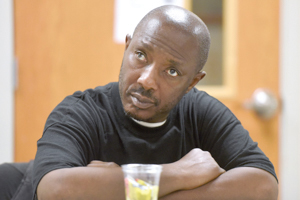
Shahid Nassir says he wants to be a force for good in West Baltimore.
Soul talk
Nassir says he began to turn his life around during his second long prison stint, as he approached his 40th birthday. During countless hours alone in his cell, he came to the realization that if his life was to stand for something, if he wanted to stay alive, he had to change. "Ain't nobody there but you; you can hear your soul talk to you," Nassir says. He prayed fervently, and says he determined to make the most of his time in prison as a way to honor God through his actions. "Any type of class you can think of, I was taking it — anything to offer myself another chance to grow and develop and be a better person," he says.

Horne
He says he came back home to West Baltimore to make amends for his role in the crime, drug trade and violence that have ravaged its neighborhoods. "I have to be a part of the solution," he says. "That is the real reason for me getting involved with TYRO." He says the men in the Baltimore program, most of whom are middle-aged or seniors, are moved by the same desire "to correct the ills they contributed to, either by not being there to prevent them, or by helping cause them directly."
Mean streets
In Baltimore, almost all of the TYRO and women's program participants hail from highly distressed African-American neighborhoods, places where prison stints are common enough to be considered a rite of passage. According to the Justice Policy Institute, a national nonprofit working for justice reform, one-third of Maryland residents in state prison are from Baltimore; and three-fourths of those people come from 25 of the city's 55 neighborhoods. Sandtown-Winchester/Harlem Park, the community with the state's highest incarceration rate, and nine other high-incarceration communities are within Bon Secours Hospital's four zip code primary service area. The 72-bed hospital is the anchor institution of Bon Secours Baltimore Health System.
Horne says many of the men and women released from Maryland's prisons each year return to Baltimore. Data from the Maryland Department of Public Safety and Correctional Services shows that of the 8,823 inmates released in fiscal year 2015, at least 1,120 returned to Bon Secours' primary service area.
Baltimore is a segregated and violent city. Over the decades, zero tolerance policies for drug crimes, targeted policing and mandatory minimum sentencing have fallen exceedingly hard on African Americans. In a report released in August, the U.S. Department of Justice found the Baltimore Police Department's "stops, searches, and arrests continue to disproportionately impact African Americans and predominantly African-American neighborhoods and cannot be explained by population patterns, crime rates, or other race-neutral factors."
What many academics, civil rights and civil liberty organizations call the "over-incarceration of African Americans" has had a deep, scarring impact in Baltimore, a majority African-American city. So much so, that Horne says community members asked Bon Secours to make it a priority to help returning prisoners re-acclimate to society and find meaningful employment.
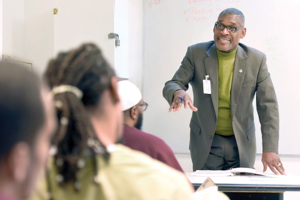
Anees Abdul Rahim, coordinator of prison reentry programs at Community Works, leads a class at the Chesapeake Detention Facility.
Blueprint for progress
Shortly after Horne started his job at Bon Secours Community Works in March 2015, he met with Anees Abdul Rahim, a seasoned and indefatigable social services program administrator. Rahim had begun Community Works' TYRO franchise several months earlier. He told Horne he was anxious to grow it and to "get behind the walls" — to teach the curriculum to inmates preparing for release from the Jessup Correctional Institution, a maximum security state prison near Baltimore. Horne heard him out and promised resources to build one of the premier prison reentry programs in Baltimore.
"'I'm going to hold you to that, and I need your help,"' Horne recalls Rahim replying. First came staff expansion. Alfreda Robinson-Dawkins, founder of the National Women's Prison Project, came on board as a consultant in October 2015 to start the women's prison reentry program. Horne hired David McDonald shortly after he graduated from Bon Secours' second TYRO class, to facilitate workshops and coordinate outreach. Rahim, Robinson-Dawkins and McDonald are black. All have served lengthy prison sentences on felony convictions. Horne says that gives them credibility with returning citizens. "They can look them in the eye and say, 'I have been where you are and I have made it. You can make it, and I will give you the blueprint.'"
Rahim says the empathy that he feels "for brothers who've been through what I've been through motivates me to do what I do."
Fever and fervor
When Rahim gets wound up in a TYRO meeting he paces the floor and builds to the full-throated, fevered pitch of a revival tent preacher. Robinson-Dawkins' approach to guiding women in transition has a warm, emotional component — one part task orientation to two parts affirmation.
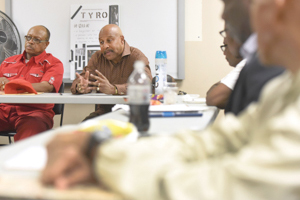
Herman Cooper, left, and Ralph Magwood, center, at a TYRO session at Community Works. Cooper mentors men in the TYRO program; Magwood teaches a Community Works class on entrepreneurship.
"'You ain't nobody,' they hear that all the time," says Robinson-Dawkins, who was a teacher and high school guidance counselor before going to prison. "I am here to say consistently, you can be anybody you want to be, honey. It may take some work, you may make some mistakes and have to start over again. But guess what, if you don't give up, you are going to get there."
TYRO meetings start with an icebreaker. Each participant offers a personal high and low for the week. At one meeting on a warm spring afternoon that mixed newcomers, TYRO graduates and mentors, the talk among the dozen-plus men is about the vicissitudes of life — family, overt and structural racism, challenges getting a job, illness and death. One man shares that his adult daughter called the night before to tell him she is addicted to heroin and needs help to get clean.
There is a raw honesty born of trust among these men, many of whom have spent a decade or more in prison, some of them for violent crimes. That openness feeds the intensity, but there is plenty of playful banter too as they talk about what it takes to be good husbands, fathers, sons and loyal friends.
Robert Boyd is at his first meeting. He tells the group he's fresh out of prison having spent 34 years behind bars. He was 16 when he went in, and scared, disoriented and overwhelmed when he came out, never having owned a credit card let alone supported himself as an independent adult. "It's a culture shock," he says. When Boyd chokes up with emotion and can't speak, McDonald says, "This is a safe space, a safe place."
"Brother, you are in the right place," Rahim chimes in. "We got your back. A man who comes out of jail after 33 years, or 44 years, how can they make it without a support system?"
Behind the walls
Earlier this year, Rahim and Robinson-Dawkins started classes at the Chesapeake Detention Facility for men and women being held while awaiting trial or sentencing. Robinson-Dawkins, who leads the women's class, says she is preparing participants for the lack of choices, the surveillance, the mind-numbing repetition of life behind bars. She advises the women to focus on what they need to do to keep their families functioning without them. She encourages them to spend the time on self-improvement and come out "not bitter, but better."
Rahim and Robinson-Dawkins teach the TYRO curriculum at the male-only Jessup prison, equipping men approaching their release dates to rebuild relationships with their kids, wives or significant others.
Horne expects that when the men get out, many will come to Community Works for social services, including case management, housing referrals, a computer lab and help finding jobs.
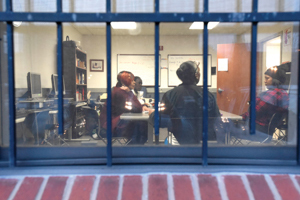
Alfreda Robinson-Dawkins, center, gets input from past participants in Community Works' character building program for women as the organization prepares to expand its prison reentry program enrollment beginning next month.
Fast track
This year Community Works launched two jail diversion programs in partnership with the Baltimore City State's Attorney's office — one for young adults and one for juveniles.
And Community Works won a $1.36 million federal grant in partnership with Seedco, an economic development company with a job training component. The grant will support a hybrid character building, job preparation program for people who have been released from jail or prison within six months. It will start with its first cohort in January. The grant will provide instruction for 170 people over 24 months. Rahim says program staff is expanding in January to accommodate the surge in clients.
Come March, all of Bon Secours' reentry programming will move out of the Community Works multifunction building into the newly renovated rectory of St. Martin Church just across the street. Bon Secours, an anchor in the hardscrabble neighborhood and a driving force in its nascent redevelopment, is converting the former church into a primary care clinic.
Through its tight connection with Bon Secours Hospital a few blocks away, Community Works provides returning citizens with access to health care, behavioral health services and addiction treatment. It's rare for reentry programs to offer such a broad array of service, says Horne, and it sets the Bon Secours program apart from other prison reentry programs.
Tyro graduate shares his experience in video
|
Finding dignity in work is a top priority for ex-offenders
BALTIMORE — For most adults, having a job is essential to well-being and dignity. Finding a good job is challenging under the best of circumstance. For individuals with criminal records, just getting past the application stage to an interview can be an exercise in repeated rejection and frustration.

Clay
That's why the prison reentry program at Bon Secours Community Works puts a lot of muscle into assisting in job training and the job hunts of men and women who have blemished legal records. "We have a hungry and talented workforce," says Eric Clay, head of workforce development for Community Works. Clay adds, "They are our community members. At the end of the day, if a training program doesn't translate to employment, then we are missing the ball."
Job hunters availing themselves of prison reentry programs at Community Works can get one-on-one counseling to identify their skills, boost their confidence and polish their resumes. They receive coaching on how to best explain their criminal history to perspective employers in a succinct "elevator speech." Job hunters can tap into a jobs database at the city's workforce development hub inside the Community Works building. Community Works classes in GED preparation, computer skills and entrepreneurship are open to people in the reentry programs.
Expunging records
Many people take job training courses in prison and are released ready to go to work. But employers reviewing a stack of job applications may discard those disclosing a criminal history without ever offering an interview. Anees Abdul Rahim, who coordinates prison reentry programs at Community Works, says the best way to clear this roadblock, is to dismantle it. He leads a weekly workshop to teach former inmates, known at Bon Secours as returning citizens, how to expunge entries on criminal records.
Rahim explains that misdemeanor and criminal prosecutions that were dismissed without prosecution, that were not processed, or that ended in a non-guilty decision or probation before a court's judgment are eligible for expungement.
In most cases, a petitioner cannot have a conviction expunged. But, under certain circumscribed circumstances, one low-level felony or misdemeanor conviction can be shielded within a lifetime from a public record review in a single jurisdiction.
"The whole purpose of this is to get them in a position where they can pass a seven-year background check," Rahim says. Maryland law allows private employers to consider legal infractions that occurred in that look-back period.
When a criminal history can't be cleared, a job applicant can apply for a $5,000 state or federal bond. That bond acts as an insurance policy to protect employers from loss for offering another chance to a returning citizen, and it comes with a tax break for employers.
Solid references
Rahim and Alfreda Robinson-Dawkins, head of women's prison reentry programs at Community Works, are well connected in the Baltimore community, and they vouch for job applicants with employers. "Their word can go a long way," says Talib Horne, Community Works' executive director.
Rahim leads the team of instructors teaching the TYRO Dads character development and prison reentry curriculum at Bon Secours Community Works.
"What we do with TYRO, we guarantee the brothers if they go to the program and graduate that we will get them a job, or a trade," Rahim says. "We have resources we developed — community partners who like what we do."
Rahim gets to know the job hunters personally over their 12 weeks in TYRO, so he speaks with confidence about their potential. He's not a pushover. "I don't want to send anybody that is going to mess it up for the next person," he says. "You can't be 100 percent, but generally I am a pretty good judge of character, and I'm pretty good at convincing certain types of employers that they need to take a chance on a guy."
Warehouse, hospitality and retail are among the industries that hire returning citizens, Rahim says. He is sometimes able to place a man in a temporary city job, as a laborer, water meter reader or trash hauler. "They are making $12 to $13 an hour; that ain't bad money coming out of prison," he says. A few have become permanent employees of the city.
Rahim says he's gotten jobs for more than 60 of the 80 men who graduated from TYRO in the first two years of the program at Community Works.
Rahim and Robinson-Dawkins keep job applicants pumped up in the face of what can be repeated rejections. "They keep grinding with you," says Teresa Clayton, a participant in Community Works' character development program for women. She has been looking for a job in the hospitality industry since the spring with help from Community Works counselors. "I've been on several interviews. If something doesn't work out, they immediately jump me on to something else. They don't give up on you. I love that about them; it's never negative," she says.
— JUDITH VANDEWATER
|
|
Bon Secours evaluates opportunities to hire ex-offenders
Brian Lynch, director of human resources for Bon Secours Baltimore Health System, says the health system's commitment to prison reentry programing is influencing its own hiring policies.
All job applicants are asked the open-ended question: "Have you ever been convicted of a crime? Please explain." The first priority in hiring decisions must be to protect the welfare of patients and the organization, he says, and all employment offers are contingent on background checks done by Universal Background Screening.
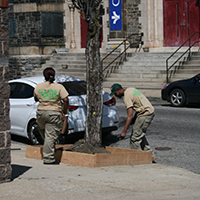
(Photo by Judith VandeWater)
"For many years our background check process has been relatively rigid," Lynch says of Bon Secours Baltimore. A felony conviction within the past 10 years was an automatic disqualifier. That's been waived on a limited, case-by-case basis in recent years. And Lynch says Bon Secours is moving towards using five years as the cutoff for disqualifying an applicant after a felony conviction.
Currently, when an otherwise qualified job applicant discloses a felony conviction that is older than five years, it will not automatically disqualify the candidate. The candidate may proceed through the application process, and, if selected to advance, a small committee that includes an individual from Bon Secours Health System's human resources, mission and other departments will review the conviction and extenuating circumstances. After discernment, the group makes a recommendation on whether to hire the applicant.
Lynch says that Bon Secours is more flexible in hiring individuals with criminal histories into its Clean and Green landscaping program. The Bon Secours Housing and Neighborhood Revitalization Department runs the program. It trains students and a handful of adults in landscaping services. They clear empty lots and plant trees in and near the West Baltimore offices of Bon Secours Community Works. Lynch says a recent criminal history is not an automatic disqualifier for applicants for training spots. "Our landscape training is a really good pipeline for returning citizens," Lynch says.
Bon Secours is appraising its more nuanced scrutiny of job applicants with criminal histories, and it may extend the pilot beyond the landscaping positions, says Lynch. "Can I tell you we are making a change tomorrow" and will consider returning citizens for five additional job classifications? "No, but we are really amenable to continuing to evaluate for other opportunities."
— JUDITH VANDEWATER
|
|
TYRO's lessons grew out of one family's hard experience
The TYRO Dads course used by Bon Secours Community Works was developed by Ron and Catherine Tijerina and is based on their efforts to keep their then-young family together during the 15 years that Ron Tijerina was imprisoned.
Each session of the character building workshop is anchored by a video lecture by Ron Tijerina. He laces his presentations with anecdotes from his prison experience. In one video touching on the topic of personal integrity, Tijerina asks if a participant's actions match his words. "When your wife looks at you, can she take everything you say as gold, or does she think 'He is just running game?'"
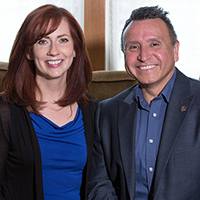
Catherine and Ron Tijerina
(Photo courtesy of the Ridge Project)
TYRO is derived from the Latin word tiro, which means a novice, new recruit or young soldier. The "TYRO Field Guide" workbook contains a number of exercises to get men thinking and talking about what it takes to be a man of character and the external and internal forces that contributed to their own self-destructive behavior. It promotes self-awareness, self-sacrifice and self-esteem as a foundation for restoring shattered families.
Underlying the TYRO manifesto is a belief that past family dysfunction and generational poverty do not preordain the future, particularly when parents begin to live up to their responsibilities to their children.
"We are all works in progress," Tijerina says in a phone interview. Catherine Tijerina adds: "There is a measure of joy and pain in everyone's life. Our goal is not to avoid struggle. We work with the inside of a person — the way they think — and we help them to accept and love themselves."
The Tijerinas introduced the TYRO curriculum inside Ohio prisons about a decade ago. Franchise programs operate in Dallas and Baltimore. The TYRO curriculum is part of a suite of programs to aid ex-offenders and their family members. It is available for purchase from the TYRO Support Services subsidiary of the Ridge Project, an Ohio nonprofit founded and co-directed by the Tijerinas. Jeremy Otte, communications director for the Ridge Project, says grant funding from state and federal sources is the organization's primary funding source.
— JUDITH VANDEWATER
|
Copyright © 2016 by the Catholic Health Association
of the United States
For reprint permission, contact Betty Crosby or call (314) 253-3477.